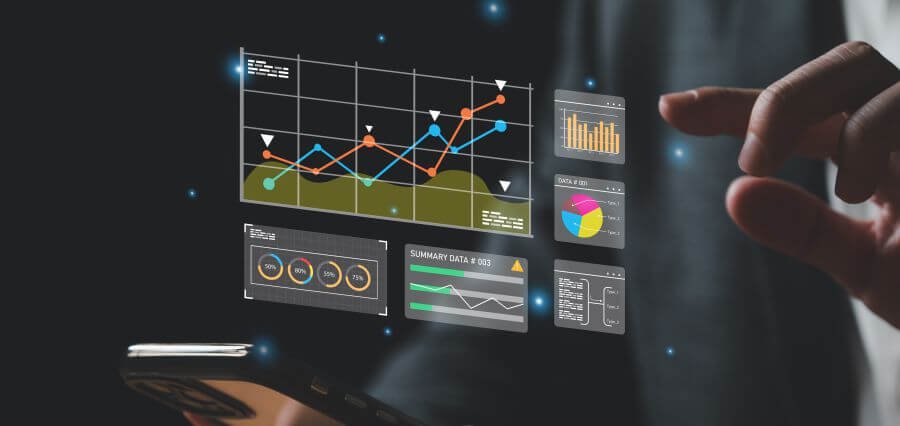Firms are looking to analytics today for insight, decision-making, and fueling growth in an increasingly changing, data-driven world. Business analytics, by way of data mining, statistical analysis, and forecasting modeling, allows firms to see history and predict patterns into the future. This article explains how firms use data to power operation, customer service, and competitiveness through a review of some real business analytics applications by industry.
1) The Retail Industry
Retail is one of the biggest consumers of business analytics. Analytics are used in retail to optimize inventory management, understand more about the buying behavior of the customers, and deliver a better shopping experience. It helps retailers save on inventory overages and stockouts by making the forecast more accurate using the analysis of the buying behavior.
To manage their supply chains, for example, big business organizations such as Walmart use advanced predictive analytics. Through the examination of point-of-sale data, market trends, and demographics, Walmart can make truly smart choices about what products to stock in different places. This will ultimately result in increased sales and better customer satisfaction.
Merchants also use customer segment data to tailor their promotion offers. Conversion can be highly increased by using pinpoint promotions developed based on customers’ purchase history. To improve customer experience and drive maximum sales, Amazon, for instance, uses smart algorithms to suggest products based on purchase history.
2) Healthcare and Medical Sector
Business analytics is revolutionizing patient care and operational efficiency in healthcare. Hospitals and clinics process big data to enhance patient outcomes, optimize staffing and reduce costs. Healthcare organizations can better allocate resources through the utilization of predictive analytics to predict patient admissions.
The application of analytics to forecast patient readmission rates is a great illustration. Risk patients can be identified and interventions be implemented for them through analysis of variables like demographics, medical histories, and treatment plans. This, ultimately, will result in improved patient care at a lower cost.
Analytics can also be used to facilitate clinical decision-making within the healthcare industry. EHR data analysis can determine best practices, improved patient safety, and optimize treatment processes. Better health outcomes can be provided as clinicians are employing systems to examine EHR data for evidence-based action.
3) The Financial Industry
Business analytics form a critical element of financial services’ ability to mitigate risk, improve trading, and improve customer relationships. Banks and investment houses use predictive analytics to predict credit risk and flag fraud. Companies can spot anomalies that can be used for fraud by monitoring consumer behavior and patterns of transactions.
For instance, by monitoring transaction patterns and marking suspicious activities, American Express uses analytics to identify and stop fraud in real-time. This makes customers have faith in it as well as saves the company from potential losses.
Analytics is also useful in investment management. Companies study trends in the market and find opportunities for investments using quantitative models and algorithms. Historical data available is utilized by the analysts to formulate strategies that yield maximum profit with minimum risk.
4) Manufacturing Sector
Business analytics improves productivity and process automation in the manufacturing industry. Organisations are capitalising on a lot of sensor and Internet of Things data to monitor the operation of equipment and be able to predict when maintenance will be required. Analytic capability combined with predictive maintenance can reduce the cost of maintenance as well as downtime by being in a position to forecast impending breakdown of the machinery.
For instance, General Electric (GE) applies analytics to its manufacturing process in order to enhance the quality of its products and eliminate manufacturing cycles. GE can enhance operating performance as well as determine inefficiencies within its processes through the examination of its manufacturing data.
Telecommunications also can be optimized with the use of analytics. Manufacturers can minimize costs as well as optimal inventory levels through analyzing demand forecast, manufacturing calendars, and supply performance.
5) Telecommunications
Business analytics is utilized by telecom operators to improve marketing, improve network quality, and improve customer care. Businesses can ascertain attrition and implement targeted retention strategies through analysis of consumer data. Businesses can improve their products by knowing the reasons for customer satisfaction and customer attrition.
Verizon, for example, uses analytics to analyze call data records and customer complaints to optimize network performance. This helps determine where client care is below par and corrective action is taken to enhance client satisfaction.
Telecommunications service providers can also forecast service needs and prescribe resources using predictive analytics. This minimizes service downtime and maximizes user experience by matching network capacity to client demand.
6) Logistics and Transportation
Business analytics has revolutionized the transportation and logistics sector through optimizing fleet management, demand planning, and route optimization. Data analytics are utilized by FedEx and UPS to optimize routes in order to save on fuel and time consumption.
These firms can make the delivery time and customer complaint reduced by providing on-the-fly route planning in accordance with the traffic flow pattern, weather conditions, and analyzing the delivery data. Predictive analytics also acts efficiently in the demand planning such that the logistics firms can manage the resources at the peak time effectively.
Conclusion
Business analytics encompasses a vast and diverse list of real-world applications that influence almost every business. Analytics gives companies the insight they need to succeed in a competitive manufactured or retail economy, from optimizing customer experience to optimizing business processes. Business analytics will be even more critical as data volume and complexity continue to increase, and it will be a matter of survival for companies willing to seek innovation and growth. Firms can make informed choices and lay the groundwork for long-term success in an evolving world by adopting these analytical strengths.
Read More: Unlocking the Potential of Specialization

